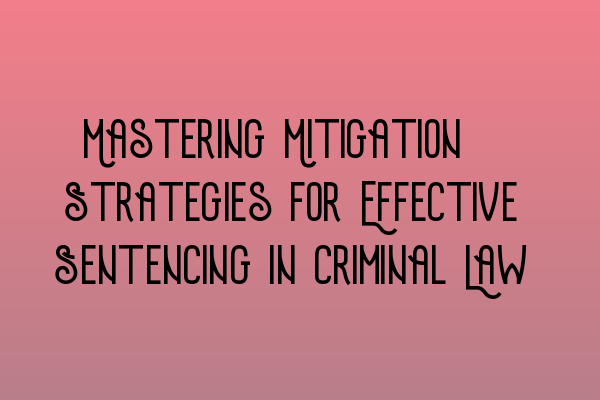Mastering Mitigation: Strategies for Effective Sentencing in Criminal Law
Welcome to the blog of SQE Criminal Law & Practice Law UK. Today, we will be discussing the importance of mastering mitigation strategies for effective sentencing in criminal law. As legal professionals, it is essential to understand the nuances of sentencing and the various strategies that can be employed to achieve the best possible outcome for our clients.
The Significance of Effective Sentencing
Effective sentencing plays a crucial role in the criminal justice system. It aims to strike a balance between punishment and rehabilitation while considering the specific circumstances of the case and the individual defendant. It is the role of the solicitor to present persuasive arguments for mitigation to ensure the court understands the unique aspects of each case without compromising their professionalism.
Mitigation Strategies
Successful mitigation strategies can result in reduced sentences, alternative sentencing options, or even the avoidance of imprisonment. Each case requires a tailored approach, taking into account the individual’s personal circumstances, background, and the nature of the offense committed.
Evidence of Good Character
One effective mitigation strategy is to present evidence of the defendant’s good character. This can involve showcasing their positive contributions to society, their previous good conduct, and testimonials from friends, family, or colleagues. The goal is to demonstrate that the offense committed is out of character and not reflective of the defendant’s overall moral character or values.
SQE 1 Preparation Courses can provide you with additional resources to understand the importance of good character evidence in effective mitigation strategies.
Remorse and Rehabilitation
Expressing genuine remorse for the offense and demonstrating a commitment to rehabilitation and personal growth can greatly impact sentencing outcomes. Solicitors should encourage their clients to reflect on their actions, seek counseling or treatment if appropriate, and engage in activities that show their commitment to becoming law-abiding citizens.
Compelling Sentencing Submissions
Well-structured and compelling sentencing submissions are essential to effectively communicate mitigating factors to the court. Solicitors should meticulously analyze the facts of the case, identify relevant legal principles, and present a clear argument that highlights the mitigating circumstances surrounding the offense.
SQE 1 Practice Exam Questions and SQE 1 Practice Mocks FLK1 FLK2 will help you enhance your skills in preparing compelling sentencing submissions.
Importance of Seeking Professional Legal Assistance
While basic mitigation strategies can be attempted by individuals, seeking professional legal assistance is crucial for achieving the best possible outcome in sentencing. Solicitors with expertise in criminal law understand the complexities of the legal system and have the experience to navigate through various sentencing options.
SQE 2 Preparation Courses offer comprehensive training to legal professionals seeking to enhance their skills in effective mitigation strategies.
Conclusion
Mastering mitigation strategies is a vital skill for solicitors practicing criminal law. By employing effective mitigation strategies, solicitors can maximize the chances of achieving lenient sentences, alternative sentencing options, or even the avoidance of imprisonment for their clients.
At SQE Criminal Law & Practice Law UK, we offer various courses and resources, such as SRA SQE Exam Dates, to help solicitors hone their skills in mastering mitigation strategies and excel in the field of criminal law.
